Greek yogurt has gained popularity as a nutritious and tasty snack for humans, but did you know it can also be a healthy treat for your furry friend?
When it comes to choosing the right brand of Greek yogurt for dogs, it’s crucial to prioritize their health and well-being.
In this comprehensive discussion, we will explore the benefits of Greek yogurt for dogs, discuss the importance of selecting the right brand, and provide you with a list of trusted brands that meet the criteria for canine consumption.
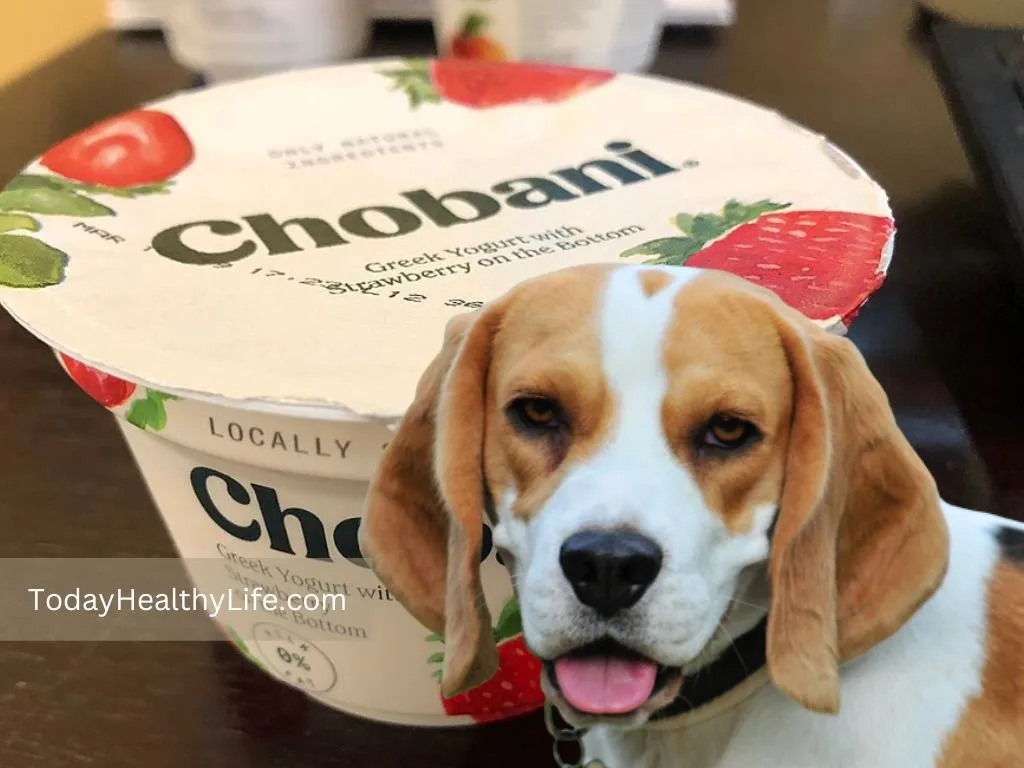
Table of Contents
The Benefits of Greek Yogurt for Dogs
Greek yogurt is a dairy product that offers a range of health benefits for dogs when consumed in moderation. Here are some of the key advantages:
1. Probiotics for Digestive Health:
Greek yogurt is an excellent source of probiotics, which are beneficial bacteria that play a crucial role in maintaining a healthy digestive system in dogs.
These live microorganisms promote a balanced gut flora, which aids in the breakdown and absorption of nutrients from food.
This, in turn, can help alleviate common digestive issues such as diarrhea and constipation.
In addition, probiotics have been shown to reduce inflammation in the gastrointestinal tract, making them particularly beneficial for dogs with sensitive stomachs or those recovering from digestive ailments.
They also bolster the immune system, further contributing to your dog’s overall well-being.
2. High-Quality Protein:
Dogs require a diet rich in protein for various physiological functions. Greek yogurt is an exceptional source of high-quality protein, containing all essential amino acids necessary for muscle development, tissue repair, and the production of enzymes and hormones.
This is especially beneficial for active dogs or those undergoing physical rehabilitation. The protein content in Greek yogurt can aid in muscle recovery after exercise or injury, making it a valuable addition to their diet.
3. Calcium for Strong Bones:
Calcium is a vital mineral that is essential for the development and maintenance of strong bones and teeth in dogs.
Greek yogurt offers a natural and highly bioavailable source of calcium. Regular consumption can contribute to your dog’s skeletal health, particularly in growing puppies, senior dogs, and breeds prone to bone-related issues.
By incorporating Greek yogurt into your dog’s diet, you’re providing them with an easily absorbable form of calcium, ensuring their bones remain healthy and resilient.
4. Low-Fat Option:
For dogs that need to manage their weight or maintain a healthy body composition, opting for low-fat Greek yogurt can be a wise choice.
The reduced fat content allows dogs to enjoy the benefits of yogurt without the excess calories associated with full-fat varieties.
This is particularly relevant for breeds predisposed to obesity or those with specific dietary needs.
By offering low-fat Greek yogurt, you’re providing a nutritious treat that aligns with your dog’s dietary requirements, promoting a balanced and healthy lifestyle.
Incorporating Greek yogurt into your dog’s diet can be a simple yet effective way to enhance their overall health and well-being.
However, it’s essential to do so in moderation and as part of a balanced diet. Always consult with your veterinarian if you have any concerns about introducing new foods to your dog’s diet, especially if they have pre-existing health conditions.
Read: How to Make Greek Yogurt?
Choosing the Right Brand of Greek Yogurt for Dogs
Selecting the appropriate brand of Greek yogurt for your dog is a critical step in ensuring their health and safety.
Here’s a more in-depth discussion on how to make the right choice:
1. Plain and Unsweetened:
When it comes to choosing Greek yogurt for your dog, simplicity is key. Always opt for plain and unsweetened varieties.
These options do not contain added sugars, flavors, or artificial sweeteners, which can be harmful to your dog’s health. Remember, dogs do not require added sugars in their diet, and artificial sweeteners like xylitol can be toxic to them.
Plain Greek yogurt provides all the beneficial nutrients without any unnecessary additives, making it the safest and healthiest choice for your furry friend.
2. Minimal Ingredients:
Examining the ingredient list is essential when selecting the right Greek yogurt for your dog. Look for brands that prioritize simplicity, with minimal, easily recognizable ingredients. Ideally, the yogurt should contain just milk and live active cultures.
Avoid products with a long list of additives, preservatives, or artificial flavorings, as these can potentially be detrimental to your dog’s health.
Choosing Greek yogurt with a short and straightforward ingredient list ensures that your dog receives the purest and most natural form of this nutritious treat.
3. Avoid Lactose for Sensitive Dogs:
It’s important to be mindful of your dog’s individual digestive capacity. While Greek yogurt is generally easier to digest due to its lower lactose content compared to regular yogurt, some dogs may still be lactose intolerant. Lactose intolerance can lead to digestive discomfort, such as diarrhea and gas.
If you suspect that your dog may have difficulty digesting dairy, it’s best to err on the side of caution and either limit their consumption or opt for lactose-free alternatives.
Additionally, consult your veterinarian for personalized dietary recommendations.
By adhering to these criteria, you can confidently choose a Greek yogurt brand that prioritizes your dog’s health and well-being.
The right choice will provide a tasty and nutritious treat that aligns with their dietary needs and preferences.
Remember, always introduce new foods, including Greek yogurt, gradually and in moderation.
Monitor your dog for any signs of adverse reactions and consult your veterinarian if you have any concerns about incorporating it into their diet, especially if your dog has specific health considerations.
Read: How Long is Greek Yogurt Good for After Opening?

What Brand Of Greek Yogurt Is Good For Dogs?
Here is a list of reputable brands that offer plain Greek yogurt suitable for dogs:
1. Chobani Non-Fat Greek Yogurt:
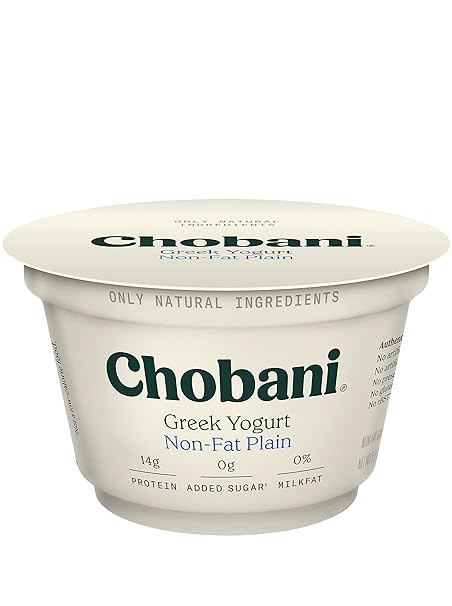
Chobani is a well-respected brand known for producing high-quality dairy products. Their non-fat Greek yogurt is a fantastic option for dogs due to its low-fat content.
This makes it an ideal choice for dogs that need to manage their weight or have specific dietary restrictions. Additionally, it’s crucial to note that this Greek yogurt variant is free of added sugars and artificial sweeteners, aligning perfectly with the criteria for canine consumption.
The absence of added sugars is particularly important, as dogs do not require additional sweeteners in their diet.
Artificial sweeteners like xylitol can be toxic to dogs, so choosing a product like Chobani Non-Fat Greek Yogurt ensures that your dog is receiving a safe and wholesome treat option.
Furthermore, Chobani is a brand known for its commitment to quality ingredients. Their non-fat Greek yogurt is likely to contain minimal, easily recognizable components, which is essential in ensuring that your dog receives the purest and most natural form of this nutritious treat.
When offering Chobani Non-Fat Greek Yogurt to your dog, start with a small amount and observe their reaction. If they tolerate it well, you can gradually increase the quantity, keeping in mind the general guidelines for portion sizes based on your dog’s size and activity level.
As with any new addition to your dog’s diet, it’s essential to monitor them for any signs of allergies or digestive issues. If you notice any adverse reactions, discontinue offering the yogurt and consult your veterinarian.
Overall, Chobani Non-Fat Greek Yogurt stands out as a suitable option for dogs, providing a low-fat, high-quality source of protein, calcium, and probiotics without any harmful additives.
Read:
2. Stonyfield Farms Organic Plain Greek Yogurt:
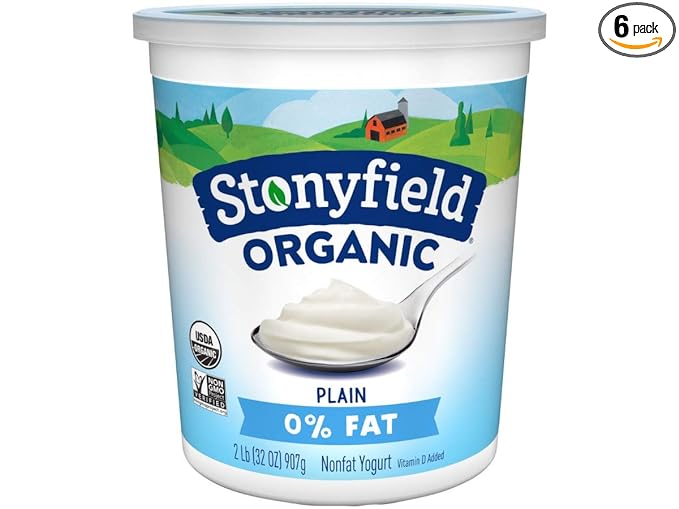
Stonyfield Farms is a well-respected brand known for its commitment to producing organic and wholesome dairy products.
Their organic plain Greek yogurt is a standout option for dogs due to its emphasis on simple, natural ingredients. This aligns perfectly with the criteria for canine consumption.
Organic certification ensures that the yogurt is produced without the use of synthetic chemicals, antibiotics, or hormones. This means that Stonyfield Farms Organic Plain Greek Yogurt provides a clean and natural option for your furry friend.
The absence of artificial additives and preservatives in this Greek yogurt variant further reinforces its suitability for dogs. By offering Stonyfield Farms’ organic option, you’re providing your dog with a treat that is free from potentially harmful substances.
When introducing Stonyfield Farms Organic Plain Greek Yogurt to your dog, start with a small amount and observe their reaction. This allows you to gauge their tolerance and ensure they are able to digest it comfortably.
This particular brand’s dedication to organic, minimal ingredients ensures that your dog receives the purest form of this nutritious treat. By incorporating Stonyfield Farms Organic Plain Greek Yogurt into your dog’s diet, you’re providing them with a high-quality source of protein, calcium, and probiotics.
As with any new addition to your dog’s diet, always monitor them for any signs of allergies or digestive issues. If you notice any adverse reactions, discontinue offering the yogurt and consult your veterinarian.
Overall, Stonyfield Farms Organic Plain Greek Yogurt stands out as a top choice for dogs, offering a clean and natural option that prioritizes their health and well-being.
3. Fage Total 0% Plain Greek Yogurt:
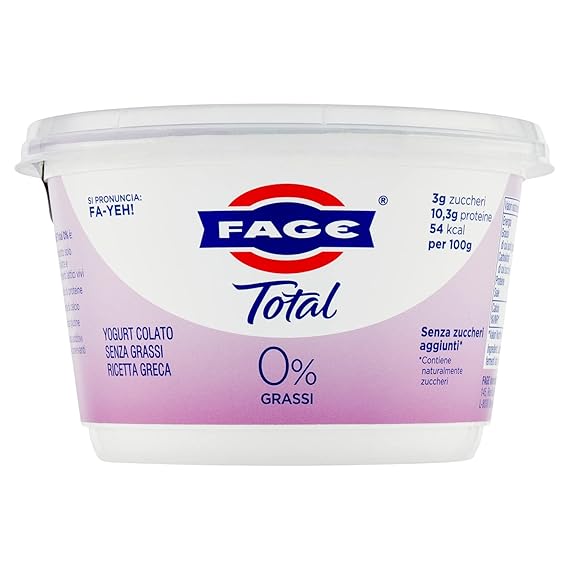
Fage is a well-established brand renowned for its high-quality dairy products. The Fage Total 0% Plain Greek Yogurt is a standout option for dogs, particularly for those who may benefit from a low-fat treat.
This variant contains no fat, making it suitable for dogs that need to manage their weight or have specific dietary restrictions.
Much like the other recommended brands, Fage Total 0% Plain Greek Yogurt is free of added sugars and artificial sweeteners. This ensures that your dog is receiving a treat free from potentially harmful additives, aligning perfectly with the criteria for canine consumption.
This whole-milk yogurt provides a balanced blend of protein, calcium, and probiotics. The absence of added sugars or artificial sweeteners means that your dog can reap the full nutritional benefits without any unnecessary or harmful additives.
When introducing Fage Total 0% Plain Greek Yogurt to your dog, start with a small amount and monitor their reaction. This allows you to assess their tolerance and ensure they are able to digest it comfortably.
Fage’s commitment to producing high-quality dairy products further supports its suitability for dogs. Their focus on providing a clean and natural product ensures that your dog receives a treat that aligns with their dietary needs.
As always, it’s important to monitor your dog for any signs of allergies or digestive issues when introducing a new food. If you notice any adverse reactions, discontinue offering the yogurt and consult your veterinarian.
In summary, Fage Total 0% Plain Greek Yogurt is a top-notch option for dogs, providing a low-fat, high-quality source of protein, calcium, and probiotics without any harmful additives. By incorporating this option into your dog’s diet, you’re offering them a treat that prioritizes their health and well-being.
4. Dannon Oikos Plain Greek Yogurt:
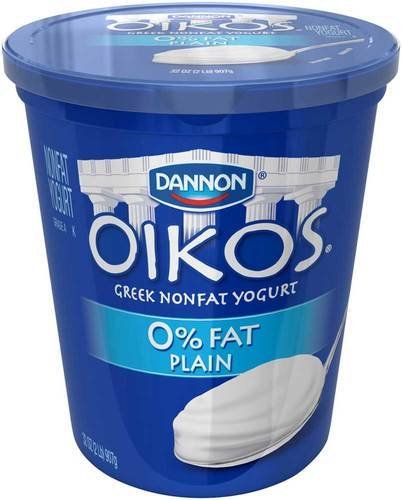
Dannon Oikos is a well-known brand that has earned a reputation for producing high-quality dairy products. Their plain Greek yogurt variant is a commendable option for dogs, meeting the criteria for canine consumption.
Similar to the other recommended brands, Dannon Oikos Plain Greek Yogurt is free of artificial sweeteners and preservatives. This ensures that your dog receives a treat that is free from potentially harmful additives, aligning perfectly with the criteria for canine consumption.
This Greek yogurt variant provides a well-rounded source of protein, calcium, and probiotics. It’s a nutritious option that supports various aspects of your dog’s health, from muscle development to digestive well-being.
When introducing Dannon Oikos Plain Greek Yogurt to your dog, start with a small amount and observe their reaction. This allows you to gauge their tolerance and ensure they are able to digest it comfortably.
Dannon’s commitment to producing high-quality dairy products further underscores its suitability for dogs. Their dedication to providing a clean and natural product ensures that your dog receives a treat that aligns with their dietary needs.
As always, it’s important to monitor your dog for any signs of allergies or digestive issues when introducing a new food. If you notice any adverse reactions, discontinue offering the yogurt and consult your veterinarian.
When considering these brands, it’s important to verify that you’re selecting the plain, unsweetened versions of their Greek yogurts. These options adhere to the criteria for canine consumption, ensuring that your dog receives the full range of benefits without any potentially harmful additives.
Remember, while these brands are recommended, individual dogs may have varying sensitivities or preferences.
Always monitor your dog for any adverse reactions when introducing a new food into their diet, and consult your veterinarian if you have any concerns. They can provide personalized recommendations based on your dog’s specific dietary needs and health status.
Serving Greek Yogurt to Your Dog
Now that you’ve chosen a suitable brand of Greek yogurt, here are some creative and safe ways to serve it to your canine companion:
1. Plain Treat:
One of the simplest and most straightforward ways to offer Greek yogurt to your dog is as a plain treat. Simply scoop out a small portion and let your dog enjoy it.
This can be an excellent way to provide a quick and nutritious snack. Remember to start with a small amount, around 1-2 tablespoons, and observe how your dog reacts before offering more.
2. Frozen Delight:
For a refreshing and engaging treat, consider freezing Greek yogurt. Use an ice cube tray or silicone molds to create small, yogurt-filled cubes.
You can even add dog-friendly fruits like blueberries or strawberries before freezing. This option is particularly enjoyable for dogs during warmer months and provides a cooling sensation.
3. Yogurt Parfaits:
Create a yogurt parfait by layering Greek yogurt with dog-friendly fruits such as bananas, blueberries, or strawberries. You can also add a small amount of honey or peanut butter for a touch of sweetness.
This layered treat provides a combination of flavors and textures, making it a delightful and nutritious option for your dog.
4. Healthy Smoothies:
Blend Greek yogurt with dog-safe fruits and vegetables to create a wholesome smoothie. This can be a fantastic way to incorporate a variety of nutrients into your dog’s diet.
Be sure to use ingredients that are safe for dogs, such as apples, carrots, or spinach. Avoid using any fruits or vegetables that are toxic to dogs.
5. Mixed with Regular Food:
You can also mix Greek yogurt into your dog’s regular food. This can be especially helpful for dogs who are picky eaters or those who may benefit from the added nutrients and probiotics. Start with a small amount and adjust based on your dog’s preferences and tolerance.
6. Homemade Treats:
Consider incorporating Greek yogurt into homemade dog treats or recipes. There are numerous dog-friendly recipes available that incorporate Greek yogurt as an ingredient. This allows you to control the quality of ingredients and tailor the treats to your dog’s taste.
Remember, while Greek yogurt can be a healthy addition to your dog’s diet, it should only be offered in moderation.
Start with small quantities and observe how your dog reacts. If you notice any signs of digestive discomfort or allergies, discontinue use and consult your veterinarian.
Additionally, always opt for plain, unsweetened Greek yogurt without any added flavors, sugars, or artificial sweeteners. This ensures that your dog is receiving the full benefits of this nutritious treat.
How Much Greek Yogurt for Dogs: Quantity and Precautions
When introducing Greek yogurt to your dog’s diet, remember these guidelines:
1. Start Small and Gradually Increase:
When introducing Greek yogurt to your dog’s diet, it’s crucial to start with a small amount. Begin with about 1-2 tablespoons and observe how your dog responds.
Monitor for any signs of digestive discomfort or allergies. If your dog tolerates it well, you can gradually increase the quantity.
2. Limit Treats to 10% of Daily Food Intake:
While Greek yogurt can be a healthy addition to your dog’s diet, it’s important to remember that it should be given in moderation.
Greek yogurt treats should not exceed 10% of your dog’s daily food intake. This ensures that they are still receiving a balanced and nutritionally complete diet from their regular dog food.
3. Consider Your Dog’s Size and Activity Level:
The appropriate quantity of Greek yogurt can vary depending on your dog’s size and activity level. Larger, more active dogs may be able to tolerate and benefit from slightly larger servings, while smaller or less active dogs may require smaller portions.
4. Monitor for Signs of Allergies or Digestive Issues:
As with any new food introduction, it’s crucial to monitor your dog for any signs of allergies or digestive issues.
Keep an eye out for symptoms like diarrhea, vomiting, excessive gas, or stomach discomfort. If you notice any of these signs, discontinue feeding Greek yogurt and consult your veterinarian.
5. Be Mindful of Lactose Intolerance:
Even though Greek yogurt is lower in lactose compared to regular yogurt, some dogs may still be lactose intolerant.
If your dog exhibits signs of digestive discomfort after consuming Greek yogurt, such as diarrhea or flatulence, they may be sensitive to lactose. In such cases, it’s best to avoid or limit their intake of dairy products.
6. Consult Your Veterinarian:
If you have any concerns about feeding Greek yogurt to your dog, especially if they have specific health conditions or dietary needs, it’s always a good idea to consult your veterinarian. They can provide personalized recommendations based on your dog’s individual requirements.
By following these guidelines, you can ensure that you’re offering Greek yogurt to your dog in a safe and beneficial manner.
Remember, every dog is unique, so it’s important to pay attention to their individual reactions and adjust accordingly. Providing Greek yogurt as an occasional treat can be a delightful and healthful addition to your dog’s diet.
How Much Greek Yogurt Can I Give My Dog?
The amount of Greek yogurt you can give your dog depends on their size, activity level, and individual tolerance. Here are some general guidelines to follow:
- Start Small: Begin by offering a small amount, typically around 1-2 tablespoons. This allows you to gauge your dog’s reaction and ensure they tolerate it well.
- Monitor for Tolerance: Watch for any signs of digestive discomfort or allergies. These could include symptoms like diarrhea, vomiting, gas, or stomach upset. If you notice any adverse reactions, stop giving them Greek yogurt.
- Adjust Based on Size and Activity Level:
- Small Dogs (e.g., Chihuahua, Toy Poodle): Generally, small dogs can have 1-2 tablespoons as a starting point. Adjust based on their tolerance and energy needs.
- Medium Dogs (e.g., Cocker Spaniel, Bulldog): They can typically have 2-4 tablespoons, but again, monitor their response and adjust accordingly.
- Large Dogs (e.g., Labrador Retriever, Golden Retriever): Larger dogs may tolerate a bit more, around 4-6 tablespoons.
- Consider Your Dog’s Health Status: If your dog has specific health conditions, consult your veterinarian. For example, dogs with certain kidney issues may need to limit their protein intake, including Greek yogurt.
- Limit Treats to 10% of Daily Caloric Intake: This is a general guideline to ensure your dog’s overall diet remains balanced. Treats, including Greek yogurt, should not make up more than 10% of their daily caloric intake.
Remember, these are general guidelines and individual dogs may have varying tolerance levels. It’s always a good idea to consult your veterinarian, especially if your dog has any specific dietary requirements or health concerns. They can provide personalized recommendations based on your dog’s unique needs.
Can All Dogs Eat Greek Yogurt?
While Greek yogurt can be a healthy treat for many dogs, it’s important to note that not all dogs can eat it. Here are some considerations:
- Lactose Intolerance: As we mentioned above, some dogs can be lactose intolerant. This means they lack the enzyme needed to properly digest lactose, a sugar found in milk and dairy products. Greek yogurt has less lactose than regular yogurt, but it can still cause digestive discomfort in sensitive dogs.
- Allergies or Sensitivities: Just like with any new food, some dogs may have allergies or sensitivities to certain components in Greek yogurt. This could be related to the dairy itself or any additives in the yogurt.
- Underlying Health Conditions: Dogs with certain health conditions, particularly those affecting the kidneys or pancreas, may need to limit their intake of protein-rich foods like Greek yogurt. Always consult your veterinarian if your dog has specific health concerns.
- Puppies and Seniors: Puppies and senior dogs may have different dietary needs. Puppies require a balanced puppy-specific diet, while senior dogs might have specific dietary requirements due to age-related conditions.
- Obesity or Weight Management: For dogs that are overweight or in need of weight management, it’s important to consider the calorie content of Greek yogurt and factor it into their overall diet.
- Consult Your Veterinarian: We already mentioned multiple times, that if you’re unsure about whether Greek yogurt is safe for your dog, or if you have concerns about their health or dietary needs, it’s always best to consult with your veterinarian.
In summary, while Greek yogurt can be a nutritious treat for many dogs, it’s not suitable for all dogs. Always observe how your dog reacts after consuming it, and consult your veterinarian if you have any doubts or if your dog has specific dietary requirements or health concerns.
Can I Give My Dog Greek Yogurt Everyday?
No. Greek yogurt can be a healthy addition to your dog’s diet, it’s best not to give it every day. Moderation is key to ensure a balanced and varied diet for your furry friend.
Overconsumption of any one food, including Greek yogurt, can lead to an imbalance in their overall nutrition. Remember, treats like Greek yogurt should only make up a small portion of your dog’s daily caloric intake.
If you have any concerns about incorporating Greek yogurt into your dog’s diet, consult your veterinarian for personalized advice based on your dog’s specific needs.
Conclusion
So, what brand of Greek yogurt is good for dogs? After careful consideration, it’s clear that opting for a plain and unsweetened variety is paramount.
Brands like Chobani Non-Fat Greek Yogurt, Stonyfield Farms Organic Plain Greek Yogurt, Fage Total 0% Plain Greek Yogurt, and Dannon Oikos Plain Greek Yogurt meet the criteria for canine consumption.
Remember, the benefits of Greek yogurt for dogs are substantial. From providing probiotics for digestive health to offering high-quality protein and essential minerals like calcium, this dairy product can be a nutritious addition to your dog’s diet.
However, as with any treat, it should be provided in moderation. Starting with a small amount and gradually increasing it based on your dog’s tolerance is the best approach. Always be mindful of your dog’s size, activity level, and any specific dietary needs or health conditions they may have.
Lastly, if you’re uncertain about whether Greek yogurt is suitable for your dog, or if you have any concerns about their health or dietary requirements, consulting your veterinarian is always a wise decision. They can offer tailored recommendations based on your dog’s individual needs.
In conclusion, with the right brand and portion control, Greek yogurt can be a wholesome and enjoyable treat for your furry companion, contributing to their overall health and well-being.
